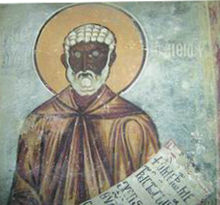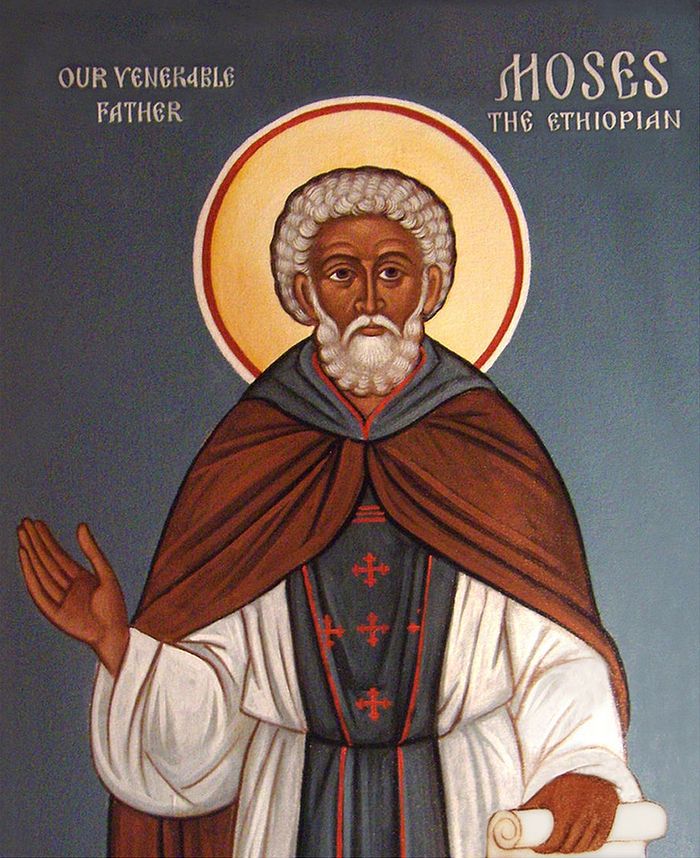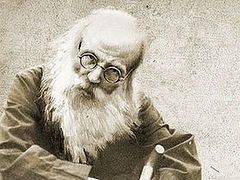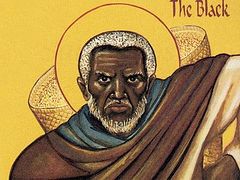Princes shall come out of Egypt; Ethiopia shall soon stretch out her hands unto God (Ps. 68:31).
In the blossoming of the early Church, we see that these prophetic words of King David did indeed come true, as Ethiopia was converted to Christianity in the fourth century. In this same century showed forth one of the great ascetic saints of the early Church: St. Moses the Ethiopian, who stretched out his hands unto God in a life of repentance for the wanton deeds of his youth. There is much we can learn from the life of St. Moses as we strive to throw off our own wanton deeds and passions in preparation for receiving our Lord in the Holy Mysteries, and for drawing nearer to Him on a daily basis, awaiting His Second and Glorious Coming in which we hope to be resurrected unto eternal life.
The troparion for St. Moses gives us an insightful look at his life and the virtues he displayed to the glory of God:
Thou didst abandon the Egypt of the passions, O Father,
Ascending the mount of the virtues with fervent faith,
Taking the Cross of Christ upon thy shoulders;
And being glorified in godly works,
Thou didst prov to be a model for monastics, O summit of the fathers.
Pray unceasingly with them that our souls may find mercy!
As God’s chosen people of the Old Covenant were held captive in Egypt, the Church often uses this to symbolize other enemies of God’s people, and especially our own passions. We see in his troparion that St. Moses is glorified for fleeing from the Pharaoh in his own soul and climbing upwards to God by his lived faith through which he acquired many virtues. By “Ascending the mount” he is likened to his namesake, the Prophet Moses, who ascended Mt. Sinai where he encountered the living God. This ascent is also heavily used by the Church to typify our own journey towards union with God.

This is the calling for each of us, and the Church provides us with a great many fasting days and periods throughout the year as special times to refocus our priorities and to commend our whole lives unto Christ our God, which is nothing more than the task to which we are called every day. Like St. Moses, we can all come into complete obedience to God through His grace. Like St. Moses, we can all offer our daily sacrifices to God especially by remembering the weightier matters of the Law—judgment, mercy, and faith (cf. Matt. 23:23). Have we thought and spoken ill of others? Have we provided for ourselves while ignoring the needs of the less fortunate? Have we kept our prayer rules? Now is precisely the time for us to repent before God for our evil deeds and to align ourselves aright on His path just as did St. Moses. It was precisely through fasting, all-night vigils and chores on behalf of the brethren that St. Moses was able to overcome his passions by the guidance of Abba Isidore and the mercy of God. The Gospel accounts of the Publican and the Pharisee can remind us of compassion and repentance and the Lord's words on the Dread Judgment remind us to always observe God’s Law. Let us heed the words of the holy Gospel and our holy services as they exhort us to sainthood!
St. Moses’ strict fasting and obedience and his compassion were his cross that he took up to follow Christ, “being glorified in godly works.” Even in his advanced spiritual state he remained profoundly humble, combining the righteousness of the Pharisee and the humility of the Publican. Upon his diaconal ordination the bishop said “Now Abba Moses is entirely white!” to which St. Moses replied, “Only outwardly, for God knows that I am still dark within.” We all refer to ourselves as the chief of all sinners before receiving Holy Communion, and our task is precisely to truly believe this. Surely St. Paul truly believed it and surely St. Moses spoke with truthful humility. Let us remember humility daily and strive to make the words of our prayers ring true in our lives.
St. Moses was later ordained to the priesthood and gathered seventy-five disciples whom he taught the path to God as Abba Isidore had taught him. At the age of seventy-five, with peace in his heart, he accepted death at the hands of a band of robbers much like the one he had joined in his youth, thus demonstrating one last time the presence of God that filled his life. His sincere repentance and deep devotion to God has earned him the praise of “summit of the fathers”—what an accolade! Some of our greatest saints began as the greatest sinners it seems. Blessed Augustine turned from the profligacy of his youth and turned to a life of deep humility, as seen in his Confessions; and of course St. Mary of Egypt is a tremendous example of the power of repentance and asceticism. Among their ranks belongs St. Moses the Ethiopian who turned from the hardness of his youth to a deep faith in our Lord Jesus Christ, marked by strict obedience, fasting, and compassionate serving. St. Moses’ life teaches us that there is always hope for all of us to turn from our wickedness and live. May we all learn from his example and follow him as he followed Christ.
“O summit of the fathers. Pray unceasingly with them that our souls may find mercy!”





Comments:
The Ethiopian Church teaches Christianity in Ethiopia dates to the 1st century AD(Acts 8:26-38.
.Orthodox took a strong foothold when it was declared a state religion in 330 AD.
In Christ,
Sister Ioanna